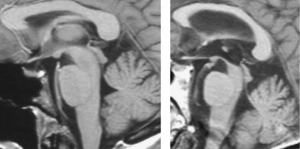Progressive supranuclear palsy (PSP)
Last edited on : 22/09/2024
Progressive Supranuclear Palsy (PSP) or Steele-Richardson-Olszewski disease is a rare neurodegenerative disease (1 to 7 cases/100,000 inhabitants) and the second most common degenerative cause of parkinsonian syndromes. The median age of onset is 65 years, with a median survival of 5 to 9 years from diagnosis.
As no treatment has unfortunately been proven effective, the essential aspects of management are the exclusion of differential diagnoses, supportive care, and psycho-social support.
Neuropathology
Anatomopathology shows the presence of:
- discrete cortical atrophy (++ diencephalon and mesencephalon), inconsistent
- neurofibrillary degeneration
- neuronal loss and gliosis
- possible granulovacuolar degeneration and/or a coarse alteration of the dentate nucleus
Clinical
The initial phase is few or non-specific:
- Imbalances, falls (60%)
- Visual disturbances (blurred vision, difficulty directing gaze)
- Psychiatric disorders (depression, apathy, emotional lability, memory complaints)
- Various: dysarthria, dysphagia, clumsiness, ++ symmetrical tremor
State phase (establishment on a median of 4 years) allowing for clinical diagnosis:
- Oculomotor syndrome: limitation of vertical eye movements (downward = the most specific), hypometric saccades, unstable fixation, later involvement of horizontal movements, wide-eyed appearance (retraction of the upper eyelids), blepharospasm,…
- Extrapyramidal syndrome: akinesia +++ with facial amimia, axial rigidity, dystonia of the neck in extension, possible dystonia of a limb, clumsy and unstable gait, other generally minor extrapyramidal signs (rare resting tremor). Symmetrical, non-dopa-sensitive.
- Pseudobulbar syndrome: fixed and spastic face, brisk masseter reflexes, monotonous/ hesitant/ nasal/ unintelligible voice, late swallowing difficulties
- Neuropsychological and frontal syndrome: moderate memory disorders, apathetic behavior, disinterest, perseverations, echolalia, word-finding difficulties, dynamic and constructive apraxia. A grasping behavior is almost constant.
- Less common: moderate pyramidal syndrome, cerebellar syndrome, hemiballism, myoclonus, choreoathetosis, sleep disorders,…
The diagnosis in the terminal phase generally poses little problem. Earlier, it should be considered in the context of an atypical parkinsonian syndrome associated with neuropsychological disorders, a frontal syndrome, or early falls… however, it is important to remember that it is not only a diagnosis of exclusion but also inaccessible to effective medical management… so it should not be made "too easily"...
The progression of these different syndromes leads to a clinical picture similar to akinetic mutism in the final stage. Death usually occurs due to recurrent aspiration pneumonia.
Additional examinations

- Eye Movement Recording (helps differentiate anomalies from those sometimes present in corticobasal degenerations):
- Rarely used outside of studies
- Brain MRI:
- Characteristic atrophy of the mesencephalon with enlargement of the fourth ventricle in 50% of cases ("hummingbird sign"), very specific
- Possible hyperintensities in the internal pallidum and mesencephalon on T2 sequences and proton density
- Brain PET Scan:
- Hypometabolism with a clear frontal predominance is common (but nonspecific)
Therapeutic Management - Treatments
- No treatment has unfortunately been proven effective. For compassionate use or as an experimental trial, small doses of L-dopa or an antidepressant may be introduced. Palliative care is recommended in the final stages.
- Paramedical management similar to other dementing syndromes, focusing on social support measures. Speech therapy evaluation of swallowing to adjust diets in the final stages (minimize aspiration, optimize comfort).
Bibliography
EMC, Neurologie, Elsevier, 2018
Factor SA et al., Progressive supranuclear palsy (PSP): Clinical features and diagnosis, Uptodate, 2024
Factor SA et al., Progressive supranuclear palsy (PSP): Management and prognosis, Uptodate, 2024
Goetz CG, Textbook of Clinical Neurology, 3th ed., Saunders, 2007
Osborn AG, Diagnostic imaging : brain, Amirsys, USA, 2d ed., 2009